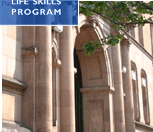
The Institute for Life Coping Skills, is a not-for-profit 501 (c)(3) research and development organization, formerly located at Teachers College, Columbia University in New York City. Its administrative offices are now in Stamford, CT. The Institute's purpose is to develop and disseminate innovative learning methods, models and educational activities to help people learn the psychological and social skills--the life skills--which are essential for living more effectively and more responsibly.
 The Institute is a capacity-building organization. It produces and disseminates multimedia counseling and teaching programs that empower agencies to empower their clients to solve predictable, normal, developmental problems in living. Specifically, the Institute specializes in psycho-social life problems related to work, self-development, marriage and significant relationships, family life, parenthood, health, and other areas of life responsibility. Its learning programs deal centrally with issues of values, character development, self-management, civic responsibility and the important links between thinking, feeling and doing.
Another way of characterizing the Institute's main mission is that it makes learning tools which are used by community agencies to improve their ability to deliver high quality counseling/learning services to disadvantaged adults and youth. The learning tools are carefully researched and developed and are specifically aimed at helping people learn more effective ways of coping with the predictable emotion-charged problems of normal development throughout the life span.
The Institute has pioneered in the use of video, multimedia and small group technologies to create group learning programs which integrate cognitive, affective and behavioral learning. With its focus on the "D" in "R and D" (Research and Development) it has also made contributions to the methodologies for designing psychologically sound, practical learning programs. The Institute is now examining the uses of interactive video/computer programs, the Internet and other transmission systems as a way of reaching large numbers of people with Learning for Living programs.
The Institute also trains teachers, counselors, administrators and other professionals to use its programs and provides organizations with on-going staff support and consulting services. The Institute deliberately aims for multiplier effects. It develops high quality programs for critical life problems which can be delivered by hundreds of delivery organizations.
The Institute was founded in 1974 by Winthrop R. Adkins, PhD, formerly Professor of Psychology and Education at Teachers College, Columbia University and now Professor Emeritus. Dr Adkins, a graduate of Princeton University and a former naval officer, received his doctorate from Columbia. His first post-doctoral position was at Harvard and he spent 5 years during the war on poverty in a YMCA-sponsored training program in Bedford-Stuyvesant, Brooklyn, N.Y., where together with Dr Paul Sharar and Dr Sidney Rosenberg, he co-founded Project TRY, a 4.5 million dollar employment education/training program for high school dropouts. The Life Skills concept evolved out of a search for more powerful counseling/learning methods for helping people learn the psychological and social skills for coping with the predictable developmental problems of life.
The Adkins Life Skills Program: Career Development Series, named for its principle author by the first publisher, was researched, designed, developed, and field tested at Teachers College Columbia University and elsewhere over a period of many years. It was first published by The Psychological Corporation of Harcourt Brace and later by the Institute. Working closely with Dr. Winthrop Adkins has been Dr. Caroline Manuele Adkins who has been a Co-author on all three editions. Other Co-authors have been: First edition: Dr. Peter Wylie, Dr. Mardell Grothe and Mark Kessler. Second edition: Dr. Anne Lovett, Donald Davis and Dr. Marilyn Cullinane. Third edition: Myriam Belloch-Cort.
The program is a ten unit, video based, group counseling/learning program designed to help disadvantaged adults and youth learn how to choose, prepare for, find, get and keep jobs. It provides a very rich set of resources for employability and career counseling, based on the central principles of vocational counseling. The program also makes use of a powerful group learning process and helps disadvantaged adults and youth deal with basic issues of identity, self-confidence, future goals, personal responsibility, values, attitudes, self-development--the basis for practical self-sufficiency and hope.
Some 20 different types of organizations, serving a wide variety of populations, use the Adkins Program, such as welfare education programs, homeless programs, women's programs, alternative high school and dropout programs, community colleges, adult basic-education programs, Head Start parent programs, substance abuse programs, one-stop centers, correctional institutions, vocational rehabilitation agencies, counseling centers, community-based and faith-based organizations, and programs for the unemployed and under employed. There are also a wide variety of other "second-chance" educating institutions serving disadvantaged and late developing adults and youth.
It is estimated that over one and half million people have been served by the Adkins Life Skills Program since the publication of its first edition in 1974. The Program now in its third edition has been used by over 1700 agencies in 43 states.
The Institute is a 501 (c) (3), not-for-profit "public charity" as defined by Section 509 (a) of the Internal Revenue Code. It has been almost entirely self-supporting in its work, through its training and its efforts to disseminate the Career Development Series.
From time to time it has also been the recipient of grants from government agencies, foundations and the private sector to support major developmental activities for projects which have been beyond its ability to fund itself. Among the foundations that have provided grants to the Institute are the Hyde and Watson Foundation, the Cleveland E. Dodge Foundation, the Exxon Involvement Fund, the Charles Hayden Foundation, The New York Community Trust, The Seth Sprague Educational and Charitable Foundation, The Achelis Foundation, The Edward S. Moore Foundation, The Charles E. and Joy C. Pettinos Foundation, The Gilder Foundation and Pitney-Bowes.
[ TOP ] |


